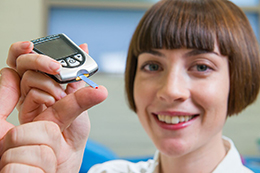08 June 2016
 One Australian every five minutes develops diabetes – that is 2016 of us every single week.
One Australian every five minutes develops diabetes – that is 2016 of us every single week.
Diabetes is the epidemic of the 21st century and the biggest challenge confronting Australia’s health system with around 1.7 million Australians currently living with the disease.
All types of diabetes are increasing in prevalence but type 2 diabetes (T2DM), which accounts for 85 per cent of all cases, is increasing at the fastest rate and there are large numbers of people with silent, undiagnosed T2DM which may be damaging their bodies.
Weight loss is a common recommendation for treatment for T2DM and pre-diabetes but anyone who has ever tried knows how challenging sticking to a daily restricted calorie diet can be.
Fasting diets, including the 5:2 diet, have had a great deal of media attention but there is very little scientific research to support such approaches.
Research into intermittent fasting being undertaken by UniSA Associate Professor Jennifer Keogh, Professor Peter Clifton and PhD candidate Sharayah Carter, in conjunction with the Sansom Institute for Health Research, is showing positive signs of providing the evidence medical specialists and dietitians need to really help people with diabetes lose weight and reduce their blood glucose levels.
“Daily dieting is difficult to maintain but it is often the standard advice provided to people wanting to reduce their weight and the other negative health outcomes that come with poorly controlled T2DM,” Sharayah says.
“As a practicing dietitian I am constantly seeing people who are looking for an alternative weight loss strategy because sticking with a regimented daily diet is hard and often not practical and therefore not achievable.
“I approached Prof Clifton and Assoc/Prof Keogh at UniSA about a pilot trial because I knew they were doing work on intermittent fasting but that they hadn’t yet done any research with people who have T2DM.”
The UniSA trial is the first of its kind and is testing the effects of a 2-day intermittent energy restriction (IER) diet with 5-days of habitual eating compared to a daily restricted diet on blood glucose control and weight loss in people with T2DM.
“IER is an alternative weight loss method we hope will prove very useful for people who find daily dieting difficult to maintain, but until now there hasn’t been any science to guide dieticians or medical specialists in using it as a treatment option for people with diabetes,” Sharayah says.
“IER uses short periods of severe energy restriction – 500 calories for women and 600 calories for men - followed by periods of habitual eating to achieve similar health improvements as daily dieting but unlike some IER diets, does not require non-fasting days to involve restricted dieting.
“The results of our pilot trial demonstrated that 2–day IER offers significant and comparable improvements in blood glucose control and weight reduction when compared to daily dieting and that IER therefore provides a suitable alternative treatment strategy for people who just can't follow a daily diet.
“In simple terms what we have shown is that for people with diabetes the same results can be achieved by fasting for 2 days and eating sensibly on 5 days as can be achieved following a daily diet every single day.”
Thirty-five people with T2DM completed the three month pilot trial with results showing both IER and a daily restriction diet achieved an average 0.6 per cent drop in haemoglobin A1C (HbA1c) and a 6.5 per cent, or 6-7kg, drop in body weight.
Some trial participants undertook IER and some a standard calorie restriction diet of 1200 calories a day for women and 1500 calories for men and all participants were asked to moderately increase their level of exercise by taking an extra 2000 steps per day.
“We will be publishing our results soon but because of the success we have had we extended the trial and have nearly gathered twelve months of data but would like to hear from people with T2DM who are interested in learning more about this trail as we extend it further,” Sharayah says.
“We achieved a 0.6 per cent drop in HbA1c in both groups which was a significant drop in the time frame and importantly all our participants who were on medication reduced their dosages which is important for both the individual and the health budget.
“All 35 of our participants are continuing the trial and we have another 18 enrolled but I am hoping to recruit more so our final number will be around 100 participants.
“If our approach establishes an alternative that allows people to strictly control their intake for two days a week and then do what they like, within reason, on the other five days and achieve exactly the same result as someone who follows a daily diet, dieticians and GPs will have a new treatment option.”
The 2-day IER trial is continuing over the next 12 months and Sharayah Carter is currently looking for adult participants with T2DM who would like to lose weight and improve their blood glucose levels.
Please contact her at sharayah.carter@mymail.unisa.edu.au or at the Sansom Institute for Health Research on 8302 1365 or sansom.researchvolunteers@unisa.edu.au for further information.
Media contact: Katrina McLachlan office +61 883020961 mob 0414972537 email katrina.mclachlan@unisa.edu.au


